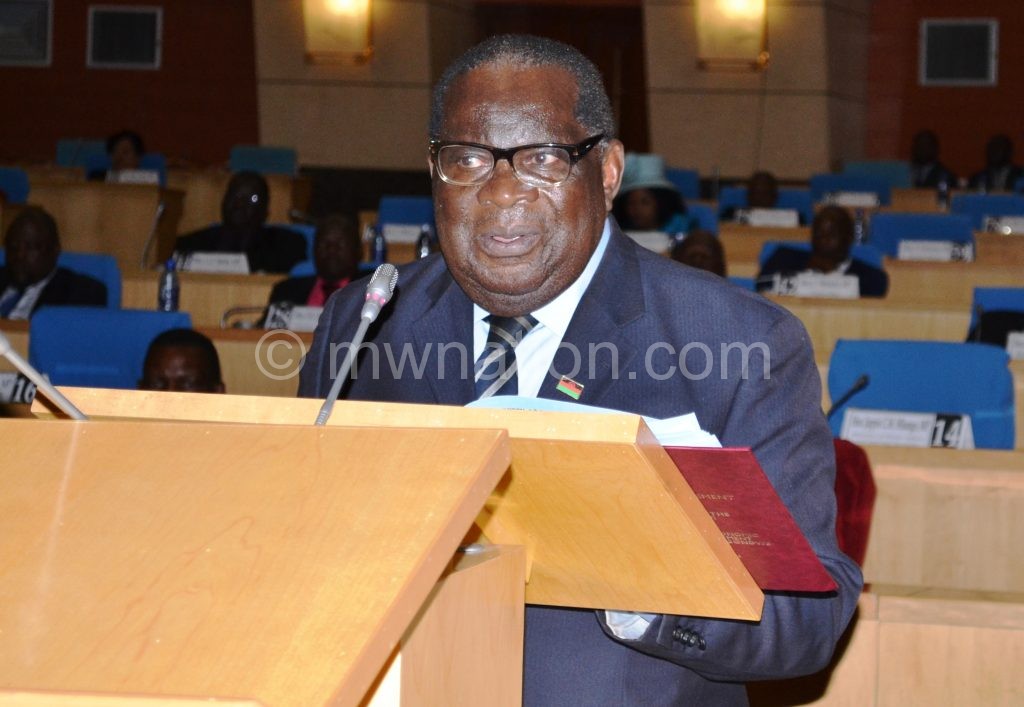Fear over rise in off-budget support
The World Bank says Malawi continues to receive a large amount of donor funding, but notes a sharp increase in off-budget financing from 51 percent prior to Cashgate revelations in 2013 to an estimated 70 percent last financial year.
The development, according to Ben Kaluwa, an economics professor at Chancellor College—a constituent college of the University of Malawi, is frightening as the recipient country will not know the delivery effectiveness.

The World Bank has since attributed the rise in off-fiscal budget funding to rising deficit as government has been struggling to spend with low on-budget donor funding.
In the Malawi Economic Monitor third edition released last week, the World Bank has estimated that off-budget financing reached 70 percent in the 2015/16 financing year that ended on June 30, in contrast to 51 percent prior to Cashgate—the plunder of public resources at Capital Hill—in September 2013.
After 2013, donors withdrew direct budgetary support, describing government’s main bank account, the Account Number One, as a leaking bucket after a forensic audit by British firm Baker Tilly established that about K24 billion was siphoned from Treasury during the six months period covering April to September 2013.
Donors have cited weak public finance management systems as the reason for their avoidance of channelling funds through government and Capital Hill has been working overtime to regain their trust.
A World Bank analysis indicates that the share of Official Development Assistance (ODA) has continued to decline since 2008/09 financial years, but this has resulted in increased off-budget funding.
Indicates the report: “This change reflects the reduced confidence in the use of government public financial management systems following revelations surrounding control weaknesses. However, this change in the share of ODA disbursed on budget is a key reason for elevated fiscal deficits in recent years.”
The World Bank also says all efforts to reduce transactions associated with the administration of donor funding such as basket funds and sector wide approaches such as the Health Sector Wide Approach (SWAp) have unravelled.
“Much of these gains have now been lost with a majority share of ODA financed expenditures now falling outside the budget,” the report said.
World Bank put the average ODA at $964 million a year over the last seven years with the highest being $1.2 billion in 2012/13.
For example, donors provided 69 percent funding budget in 2008 but this fell to 56 percent the following financial year then 49 percent in 2012/13.
From 2013/14, on budget financing decreased to 41 percent and has reached 30 percent in the World Bank estimates for 2015/16 financial year.
However, the new modality of budget financing means that the government has no control over how resources from donors are used.
Kaluwa said off budget support was indeed difficult to monitor but that was not the only problem.
He said: “That kind of support though needed is usually impossible to orient with national development agenda in terms of priorities and timing. Even more frightening is that the recipient country will not know the delivery effectiveness: how much of the X donated is going to the target versus going back to the donor as capacity building effort, consultancies or so called visibility such as adverts, billboards, display logos.”
Minister of Finance, Economic Planning and Development Goodall Gondwe has also expressed concerns at the high levels of off-budget financing arguing that the government has no control over how the money is used as it is channeled through non-governmental organisations (NGOs), mostly international.
“The government cannot properly decide on expenditure priorities nor properly plan and time the delivery of goods and services in some critical areas. This development means that the government including Parliament does not have decision-making responsibility over an increasing amount of resources available to the public,” he said.
However, the donors have defended their contravention of the Paris Declaration on Aid Effectiveness which advocates for budgetary support systems arguing that the 2011 Busan Partnership for Effective Development Cooperation focused on achieving results if the full use of country systems was not possible and as far as they are concerned, Cashgate made it impossible to use on- budget mechanisms.
The shooting of former Ministry of Finance budget director Paul Mphwiyo outside the gate of his Area 43 residence in Lilongwe on the night of September 13 2013 is widely believed to have led to revelations of the plunder of public resources at Capital Hill.
Former president Joyce Banda ordered an audit which British forensic audit firm Baker Tilly carried out covering the period April to September 2013. The audit established that about K24 billion was siphoned from public coffers through dubious payments, inflated invoices and claims for goods or services not rendered.
In May 2015, a financial analysis report by audit and business advisory firm PricewaterhouseCoopers (PwC) also established that about K577 billion in public funds could not be reconciliated between 2009 and December 31 2014.






Had to take aspirin to understand the story. Next time break down the jargon and keep the story, which goes all over the place, simple and straightforward.